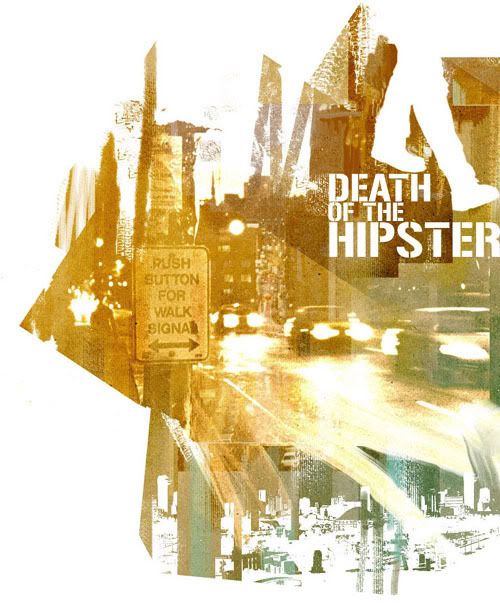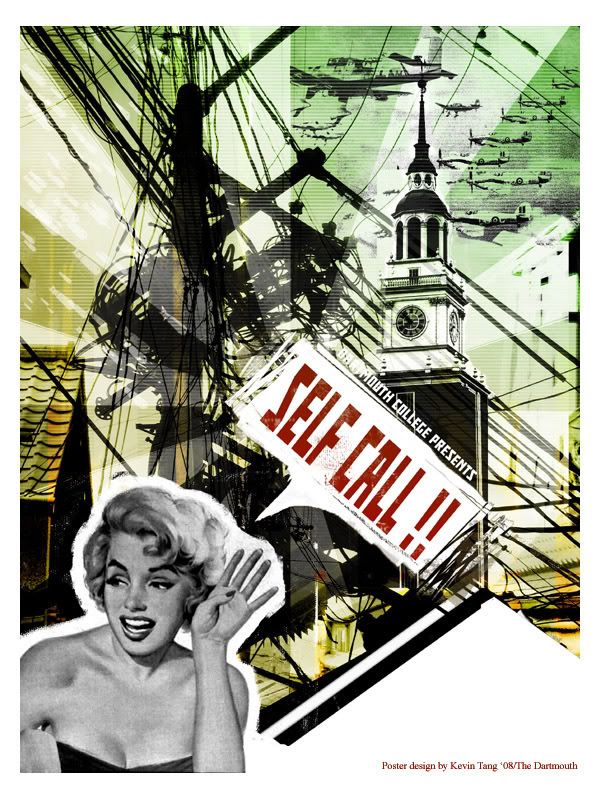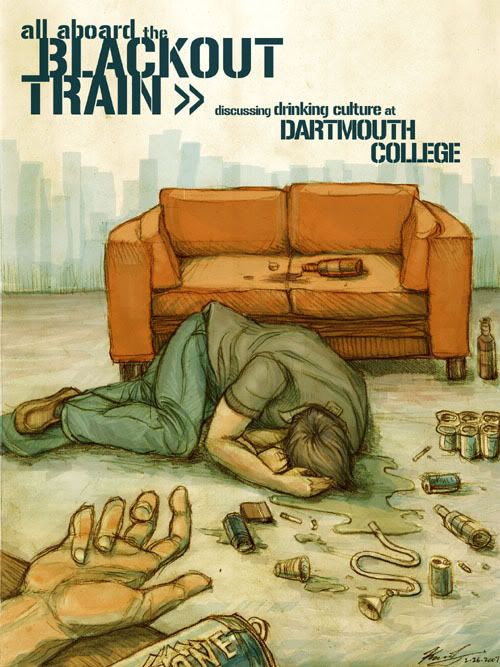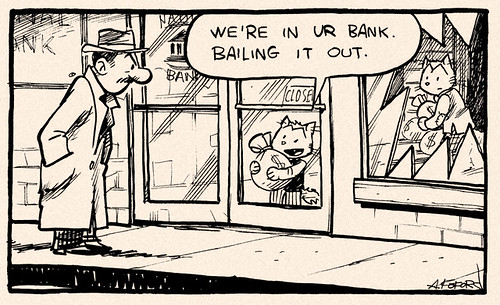The Onion has been penning a streak of hilarious and surprisingly humane articles (rather than the puerile/bullying/intensely mean-spirited snark that they sometimes indulged in). Recent headlines: "Obama Runs Constructive Criticism Ad Against McCain," "Wealthy Teen Nearly Experiences Consequence", and "Report: 60 Million People You'd Never Talk To Voting For Other Guy". A quote from the latest article:
"The report maintained that, during your purely hypothetical discussion, both of you would come off as smug, narrow-minded, or downright ignorant if you tried to criticize the other candidate's positions on key issues such as abortion and gay rights. The ensuing argument would only further cement both of your feelings of disgust toward the other candidate.
[SUPER WALLACEIAN STATEMENT ALERT] And yet incredibly, sources said, neither one of you would technically be wrong.
Because—and this is reportedly the most maddening part—even though these people's unwavering support for their candidate completely dumbfounds you, you cannot even get angry at them, since they are not voting for him because they are idiots or because they want to spite you, but rather because they actually believe that he is the better choice to run our nation."
[Sorry to plug this in yet again but for the love of god do read DFW's speech -- okay I'm done talking about him I swear.]
----------------------------------------------------------
Among those Onion stories, the last one is not very ha-ha funny, but it's quote-unquote "interesting to consider." I just had a bar conversation about how New Yorkers always make fun of the supposed Red State Proletariats who "believe everything Fox News reports" and yet the funny thing is we personally do not know a single person for whom this is true. So this seems like a pretty lame supposed-person to rant about. The RSP, at least as an abstract object of conversation in New York, is more effigy than valid opponent.
Of course, statistically speaking, there are many people out there who believe Fox New to a tee, as there are those who hold The New York Times and Village Voice as their bible, but this is not theoretically interesting to talk about. Most of the time, talking about an exaggerated extreme just generates conditional and vacuous statements. Like the last sentence I just typed out.
I guess a reason why I could never take seriously a rant about effigized Evil/Ignorant/Dumb Opponents, even when penned by myself for cathartic effect, is because it's absolutely calcified and narrow and rife with id-driven emotional disgust rather than superego-checked acknowledgment of fallibility. It's an opinion that is felt first, then rationalized, rather than vice-versa. There's a reason Sherwood Anderson called people who led their lives according to narrow absolute opinions 'Grotesques'. There's also a reason why Ralph Waldo Emerson said "a foolish consistency is the hobgoblin of little minds." Or consider John Gardener: "One trouble with having read nothing worth reading is that one never fully understands the other side of one's argument, never understands that the argument is an old one, never understands the dignity and worth of people one has cast as enemies." And finally, for the same reason, it's no coincidence that young people are called 'impressionable,' for their often unconditional endorsement of single worldviews, rather than remixing many at once.
My mom's opinions on the moral failings of Taiwan's Kuomingtang colonizers are mostly spot-on, but her dogma is in assuming that every Nationalist is culpable or brainwashed until proven otherwise.
At a literary seminar in Berkeley, some students wanted the professor to just goddamn give his final conclusion on what Pynchon's novels meant and why they're important. To the prof's credit, he replied: "if you want tidy conclusions about everything, ask religious fundamentalists or liberal extremists -- they have all the answers in the world."
I think one of the most admirable things about *good* scientific thinking is that it constantly criticizes, modifies and improves its thesis. It does not jump to conclusions without doubting itself a million times.
The good scientist -- and thinker, and writer -- should be mouth-foamingly eager to know if it's wrong, how it can correct itself, etc.
Pretty cliched stuff, I know. And the funny thing about cliches is that you can understand them when you're 15 and you'll understand it into your 40s too, but the older you get the more nuanced your understanding. We have all been taught in middle school (or earlier) that there are "two sides to every argument and both sides are kinda valid." We sorta agree to that at an early age, but it's easy to forget, and it's actually very difficult to understand fully.
I certainly don't understand it yet. See, my dogma is in believing that entrenched opinions are automatically in danger of being terribly flawed, and thus in danger of committing terrible wrong.
So sue me, I have a love affair with not taking absolutist stances. Call me a soft-minded fence-sitter and accuse me of Postmodernity if you please. But I hope this not just a lazy garden variety of relativism, but rather a sincere effort at explaining my general aversion to taking sides on any given issue. For me, as well as for many writers, observations are far more interesting than conclusions.
*SUGGESTED WAYS TO CRITICIZE ME*
For Yuppies: point out that only an unworldly slacker with a sheltered upbringing can ever afford to scorn the Real Life necessity to make conclusions & take action. Ad hominem criticism for the win!
For Marxists: point out that only a well-off bourgeois with a pampered upbringing can ever afford to scorn the Real Life necessity to make conclusions & take action. Because oppression is everywhere and you need to fight the good fight and don't ever extend sympathy to the Devil. Ad hominem DOUBLE KILL!
For Republicans: call me a flip-flop. An Obama-like elitist. Call me not man enough to defend an absolute position.
For Artists: Pomo group hug! Want a toke of that J?
For Scientists: "As a matter of fact, you misunderstood the scientific principal and the humanities are for dumb inferior people anyway!"
2008年9月29日 星期一
Gallery of Self-Call
Just sorted through my hard-drive and organized some of my graphic design stuff from college.
Hello, employers-





Hello, employers-





2008年9月28日 星期日

The
I vetoed the hell out of it (LIKE THE HOUSE DID TO THE PAULSON BAILOUT PLAN -- zing??) since the noise level around here is already high enough to require earplugs during sleep.
In other news, I was hanging out with Danker + Waldron on Saturday night and we accidentally ran into a hidden bar. We were in East Village, literally a block south of where I live, snacking at some hot dog stand when we noticed that people kept on disappearing into a tiny phone booth in the diner.
"So uh... I hear there's a secret bar around this area where you have to ring a phone in a hot dog diner to go in," Danker said.
"So I heard too."
"This might be it, then."
Then a line started to form in front of the phone booth. Obviously we had to give it a try. We went into the phone booth, dialed the phone, and some snooty waitress opened a crack at the door.
"Name?" she asked.
"The Baron," Danker said.
She arched an annoyed eyebrow, obviously not amused. "And reservation number?"
"None."
"Let's see... that will be an hour wait."
"Oh, screw that," my older bro said.
"Have a good night," she said and slammed the door.
2008年9月14日 星期日
Franzen @ BK Book Fest
I attended the Brooklyn Book Festival to say hi to my former editors. The atmosphere among the writers was (to quote an NYT obit) like a wake. After my editor introduced Jonathan Franzen to the audience, Franzen got onstage and said "I really don't want to be here right now; one of my best friends passed this Friday."
The director of Helvetica walked out later and said Franzen was being a primadonna.
On the subway towards Brooklyn, I was reading DFW's essays. A couple came up beside me and said quietly "what happened this weekend was really sad," and I nodded. They asked me if I was reading in tribute.
(I'm still trying to understand, in a weirdly Wallaceian way, why this hits me so hard and I think it's because DFW reminds me of Ms. McDowell, my high school mentor, who passed away after I went off to college. Both of them had an intense and often un-hip humanist moral seriousness that made you feel distinctly that someone very compassionate, thoughtful and incredibly smart wants to see you become the best damn human being you can be, and what drives you is knowing that someone out there would rather you be a decent, thoughtful, meaningful person rather than a rich/powerful/famous one.)
Franzen is an amazingly witty author as expected. He later apologized for saying that he didn't want to be here. It was just... fuck.
After Franzen, Russel Banks read like Colonel Sanders narrating the intro of Transformers or Planet Earth. "In the beginning, there was a cube....
The director of Helvetica walked out later and said Franzen was being a primadonna.
On the subway towards Brooklyn, I was reading DFW's essays. A couple came up beside me and said quietly "what happened this weekend was really sad," and I nodded. They asked me if I was reading in tribute.
(I'm still trying to understand, in a weirdly Wallaceian way, why this hits me so hard and I think it's because DFW reminds me of Ms. McDowell, my high school mentor, who passed away after I went off to college. Both of them had an intense and often un-hip humanist moral seriousness that made you feel distinctly that someone very compassionate, thoughtful and incredibly smart wants to see you become the best damn human being you can be, and what drives you is knowing that someone out there would rather you be a decent, thoughtful, meaningful person rather than a rich/powerful/famous one.)
Franzen is an amazingly witty author as expected. He later apologized for saying that he didn't want to be here. It was just... fuck.
After Franzen, Russel Banks read like Colonel Sanders narrating the intro of Transformers or Planet Earth. "In the beginning, there was a cube....
Farewell David Foster Wallace
One of my favorite essayists
David Foster Wallace passed tonight.
He was found dead in his home by his wife. Hanged himself. I really don't know what to say.
His own words:
"[L]earning how to think really means learning how to exercise some control over how and what you think. It means being conscious and aware enough to choose what you pay attention to and to choose how you construct meaning from experience. Because if you cannot exercise this kind of choice in adult life, you will be totally hosed. Think of the old cliché about quote the mind being an excellent servant but a terrible master.
This, like many clichés, so lame and unexciting on the surface, actually expresses a great and terrible truth. It is not the least bit coincidental that adults who commit suicide with firearms almost always shoot themselves in: the head. They shoot the terrible master. And the truth is that most of these suicides are actually dead long before they pull the trigger."
Flashy postmodern smartass writers are dime a dozen, but he's a rare contemporary author with heart to temper sophistication. The world lost a beautiful mind.
David Foster Wallace passed tonight.
He was found dead in his home by his wife. Hanged himself. I really don't know what to say.
His own words:
"[L]earning how to think really means learning how to exercise some control over how and what you think. It means being conscious and aware enough to choose what you pay attention to and to choose how you construct meaning from experience. Because if you cannot exercise this kind of choice in adult life, you will be totally hosed. Think of the old cliché about quote the mind being an excellent servant but a terrible master.
This, like many clichés, so lame and unexciting on the surface, actually expresses a great and terrible truth. It is not the least bit coincidental that adults who commit suicide with firearms almost always shoot themselves in: the head. They shoot the terrible master. And the truth is that most of these suicides are actually dead long before they pull the trigger."
Flashy postmodern smartass writers are dime a dozen, but he's a rare contemporary author with heart to temper sophistication. The world lost a beautiful mind.
訂閱:
意見 (Atom)